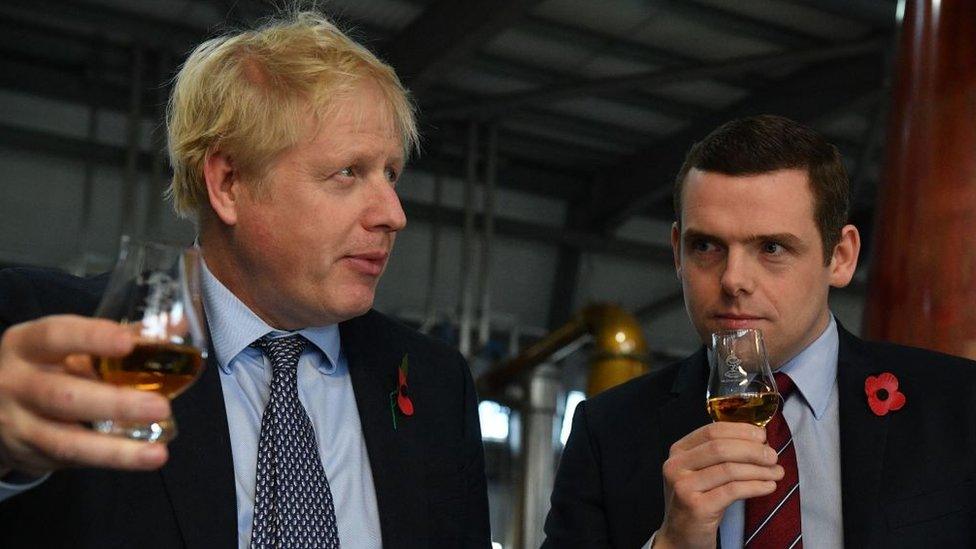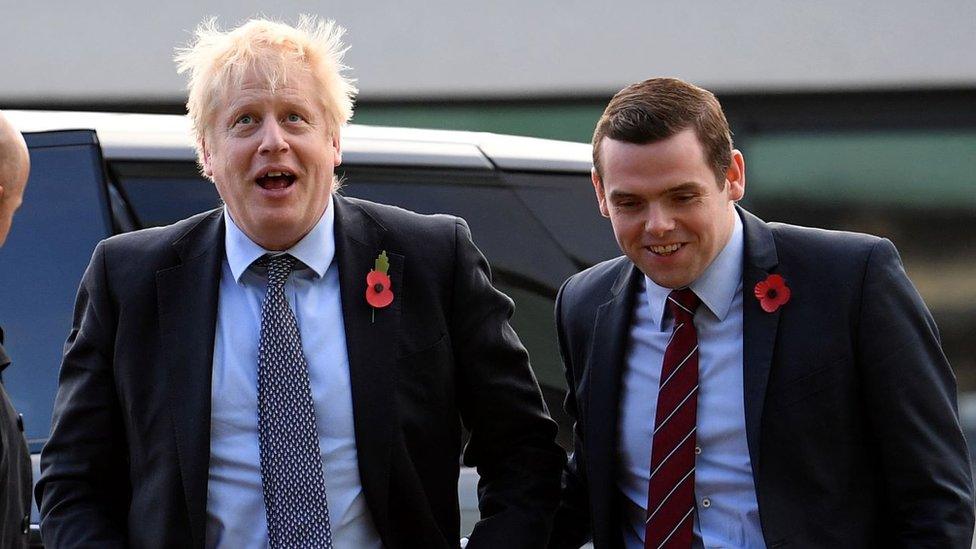Backing Boris: Douglas Ross's Partygate dilemma
- Published

MPs love tying their opponents in political knots but generally try to avoid doing that to themselves.
Douglas Ross is taking an exceptional approach. He is currently giving a masterclass in making life difficult for himself.
To be fair, it is not Mr Ross that's broken Covid rules, but his ever-changing response to lockdown misdeeds in Downing Street is adding to his burden.
In January, he said the prime minister's position had become "untenable" and called for his resignation.
When the war in Ukraine began, he withdrew his letter demanding a confidence vote in the PM's leadership, arguing that unity was required in the face of Russian aggression.
Mr Ross is still officially backing the prime minister because of the international security situation, but there are new nuances in his position.
First, he told Sky News Mr Johnson "should step down" when the war is over, making clear how limited his support actually is.
Second, he told the BBC that the prime minister would have "little option" but to stand down if an inquiry by parliament's privileges committee finds he has knowingly misled parliament over Partygate.
That suggests Mr Ross accepts that it would be possible to change prime minister during the war after all.

It is, of course, not certain that the committee will reach that conclusion and not certain that Boris Johnson would automatically quit if it did.
It is worth remembering that he has already shrugged off a ruling by the UK Supreme Court that his government had persuaded the Queen to unlawfully shutdown parliament during the Brexit period.
If the PM is determined to stay, then that is what will happen unless Douglas Ross and other Conservative MPs choose to remove him.
It is not clear what would trigger sufficient numbers of Tory MPs to move against their leader.
Many keep deferring a decision. Some of those who have previously deferred to the police and deferred to Sue Gray are now deferring to the parliamentary committee.
It all "rolls on" to the privileges committee's report, was how one MP put it to me.
Partygate flip-flop
That is not very satisfactory to many in the Conservative group at Holyrood who eagerly want to see the back of Boris Johnson.
Mr Johnson is not a very popular figure in Scotland and there is no shortage of Tory MSPs who think he is harming the party's prospects and cost them seats in the recent elections.
There is some frustration in the group with Douglas Ross's flip-flop on the PM's future but also a degree of understanding that Partygate has placed him in a difficult position.
The war is not the only reason there is no great clamour among Tory MPs for Boris Johnson to go. The lack of an obvious successor is another.
Poor results for the Conservatives in the forthcoming by-elections in Wakefield and Tiverton and Honiton could darken their mood.
So too could a privileges committee finding against the prime minister.
It is also possible they might decide to stick with him and take their chances under his leadership in the next UK general election.
The longer Boris Johnson remains in office, the more likely that scenario becomes.
That would be a very difficult election for Douglas Ross and the Scottish Tories - having to campaign for a prime minister many of them simply do not support.
- Published25 May 2022
